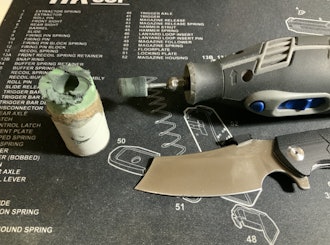Click to view our Accessibility Statement or contact us with accessibility-related questions





Top Tim Tournament Training Tips
Related Posts
BillA2021
Buy replacement quartz movement
Is an original quartz movement or a suitable substitution available for my Wenger 7900X watch at a reasonable cost, or is this not feasible I’m new at this. Thanks.
Mar 18, 2021

reswright
Basic Flip Smoothing
So you picked up a budget bearing knife as a ‘project’ knife to putter around with and you’re looking for ideas? One thing you can do is polish the bearing works, smoothing both the flip and the close action until you've got some semblance of a noiseless flick open and a smooth, gravity drop shut. This can be done many, many different ways, as many ways as there are to smooth and then polish metal; your humble narrator prefers to use a Dremel, using the following steps. I should probably make some kind of disclaimer statement here - this guide is for people already handy with a Dremel. If you’re not already handy with one it’s best not to learn how to use one while handling pocket knives or other sharp and pointy things. Hand held high RPM rotary grinding tools can be surprisingly violent if they get out of your firm grasp, they can impart an astonishing amount of kinetic energy to small sharp things you're trying to polish, sending them flying further and faster than...
Feb 6, 2021
RayF
RayF's Guide to Thanksgiving Day Watches
Please do enjoy your Thanksgiving (for those of you in countries where that means something), but please, please, please--whatever you do--don't wear either of these tacky watches while you're doing it!
Nov 26, 2020
Trending Posts in More Community Picks

Graham88
Completely surprised by the lack of blade diversity here on Drop...
I’ve been a collector of Blades since before my teens, and a retailer coming up on 15… or maybe 20 years. Drop has really been kind of an interesting experience for me, because I do occasionally get to see some unusual tech and sometimes EDC items that otherwise I might not have been aware of. And maybe it’s because I have a deep love of cutlery and bladed weapons, but I find myself trolling through the site looking at it what’s available; and it’s just it’s pretty much the same. And the bladed community here is just always confused me.. every single knife is about the same, they’re almost all drop points and although the handle materials change and brands change.. it’s really just the same knife over and over and over again... occasionally you’ll see a tanto or a slight variant; but rarely… and almost never a serrated blade. And I’m just deeply amazed at this diversion of serrated blades. And I’m just surprised there isn’t more of a request for diversity here.... and I...
Mar 12, 2020
JellyDPhoto
Can we get Sony E-Mount or other mirrorless camera options please..
Would be nice to see some Sony E mount full frame cameras on here. I currently shoot with a A99 and they killed the lense path for better or more option lenses and now is all E-Mount. 🤔
Jan 13, 2020
RayF
There Are Pandas, and Then There Are Pandas.
And this isn't either of them! The Pandas we're talking about here, are watches, not bears. And what got me thinking about them (again) was a link posted this morning by @cm.rook who pointed a few of us to the very attractive (and not terribly priced) Yema "Rallygraph" Panda which, in it's most traditional arrangement, looks like the one on the left, but can also be had in the version on the right: The model on the left is a true Panda, while the model on the right is called a reverse Panda. The reason for that distinction is clear--Panda bears, only come in the first arrangement. Now at this point, everyone should be thinking about the most well-know Panda, The Rolex Panda, which is actually a Daytona, and among Rolex Daytonas, the most famous of which is the Paul Newman Daytona, which was famous first, because it was Paul's, and second because it sold at auction for $17.8 million (US Dollars). The story of that auction is well-known so I'll only...
Nov 8, 2019







However, this generally is not the case for me. With a full time job and commitments outside of the game, I very rarely am able to play during the week. When I check the social media of and read articles by my player peers, it boggles my mind how many hours they can devote to playing each day. It is partially my fault as I’m not a fan of playing online – there is nothing better than sitting down across from a person and playing live games… playing versus a screen just isn’t fun for me. I usually reserve my few Magic playing hours each week to a live store draft with friends. Given all this, when I sit down across from my opponents at a Pro Tour or in the late rounds of a Grand Prix, I am usually way behind in terms of hours played and knowledge of the format or a matchup. There are a few things that help me bridge that knowledge and experience gap though. Being on a team of talented players certainly helps – I rely on my teammates to evaluate cards, decks, and strategies, and trust their conclusions when I don’t have time to investigate myself. Today I’d like to talk about ways I help myself make the most of the limited amount of time I have to prepare for a tournament, and how I deal with and accept the pressures of playing high level tournament Magic.
Know your limitations as a player
I find that one my biggest strengths is knowing that I am weak. Self-realization is important for everyone, not only in preparation for an event, but also in setting expectations. Most players have the luxury of time and are able to try out most of the tier 1 or tier 1.5 decks when preparing for a PT or GP. However knowing that my time is limited, I can generally only test a handful of decks. I also know that I am extremely weak at playing control strategies. Whether it is a lack of mental fortitude to pilot a thought-intensive deck for upwards of 8 hours, or the lack of format knowledge to know which threats need to be mitigated and which can be ignored, or I’m just not bright enough to make enough correction decisions to win a long game, if there is one thing I know it’s that I generally cannot play control decks. This means I can eliminate all of the control and most midrange decks, and focus on linear and/or aggressive decks. Identify your weaknesses, and learn to accept them or figure out ways to work around them. Only try to correct or improve them if you have the time to do so, not if you’re under the gun preparing for an important event.
Test with purpose
Playtesting is something that I feel I've improved the most over the course of the past few years, thanks to the processes the Massdrop team uses to test for events. When testing for an event, don't just jam games. Come up with a process. Try and figure out what matchups you expect and find a willing test subject to play those match ups against you. And be methodical about it. Play 6-10 games pre sideboarded, alternating play/draw. Record wins, losses, mulligans, common game states, important cards in the match up, and mistakes made by players. Chat about interesting games and take notes. Then play another 8-12 games post sideboarded, and allow for more than 15 sideboard cards if you are trying to test specific cards out. Same thing - record wins, losses, take notes. When playtesting you are not only trying to figure out if deck A is favored against deck B 70/30, but also what are the important factors in the match up. Discuss the match up with your playtest partner to ensure you are both on the same page about your notes and conclusions. Not only do you need to figure out why and how deck A wins 70% of the time, but also how deck B wins. Simply concluding that deck B is "unfavored" is not very helpful if you end up playing deck B at your tournament. How deck B wins and loses the matchup is what you need to figure out.
Use a cheatsheet
I went to school in the stone ages where we took tests on paper and unscrupulous kids used paper to jot down little cheatsheets to refer to during tests. Obviously I’m not condoning cheating, but the rules of Magic do allow you to have paper notes that you can review between games. At a minimum, I always have sideboard plans written down that I can refer to between games. I’m not sure why every player does not do this, even as a sanity check. As a 40-something year old geriatric, I no longer have the mental capacity to retain exact sideboard plans for each matchup, which is why a written sideboard plan is vital to me. However, even if you are able to memorize every sideboard swap for every matchup, why not have a cheatsheet prepared to ensure you’re sticking to the plan and not forgetting something? The mental energy saved by not having to recall every sideboard plan from memory for each matchup adds up over the course of an 8 round tournament. For Modern Grand Prix’s and occasional Pro Tours, I have adopted a process introduced to me by Massdrop East teammate Mark Jacobson. At GP Houston in 2016, Mark was spotted in a feature match referring to a notebook with several pages of decklists. The coverage team affectionately referred to it as a “Trapper Keeper”.
Keep your head in the right place
During the course of a tournament it is important to have mental toughness when things are going both poorly and well. Having a solid mental framework will combat negative thinking, and assist you in recovering quickly from a bad outcome. It will also help bring you back to Earth after great wins. Below is a set of conscious decisions that I often find myself making during the course of tournament play. Using these techniques has helped me in combating negative and unproductive modes of thinking.
• Treat each match as an opportunity to improve at the game you love, while accepting the fact that you may lose. If you do lose, take away lessons from it both in terms of in-game and mental preparation. Do not waste energy on excuses, whether or not they are justified. Complaining about mana screw/flood is a waste of time. In victory, make sure to reflect on the actions you took to get there and also try to identify mistakes both you and your opponents made and learn from them.
• If you sit down across from someone who appears to be less skilled than you, do not treat them as such. Take them as seriously as any other opponent. If you sit down across from a pro player, don't panic or get nervous. Do not be distracted with thoughts about your opponent's skill level during the match. Focus on the game.
• Whether good or bad, do not think about the probable future result of the game while it is in progress; think about what you (and your opponent) are going to do with the current board state in order to win. Furthermore, do not think about your current or future tournament standing during a match. The board state for the game in front of you is neither affected by your tournament standing nor by how many future matches you need to win to make the top 8.
• During the course of the tournament, identify and accept your weaknesses for the given format, deck choice, day, etc. This goes back to my first point about knowing your limitations. However, don’t let yourself become distracted with your perceived limitations while playing, but do address them later when reflecting back on how you could have changed your preparation methods to strengthen those weak areas. Instead recognize that what you do know gives you the tools to play to the best of your ability and preparedness level.
In general, I just try to remain relaxed and not get excited about wins or down about losses. Applying the above is not easy to do, especially being able to control your emotions when variance is not on your side. The point is to have a conscious goal of ignoring the things that will only serve to distract you from playing games of Magic to the best of your ability for that given day/tournament. It is up to you to know what these distractions are for you, to set them aside, and return to productive lines of thought, focused play, and most importantly having fun. I can’t stress this last point enough. Always check in with yourself and make sure you are enjoying your time playing the game!
PREVIOUS ARTICLES · Meet the Massdrop Teams: http://dro.ps/mtg-team-announce · *2nd* at Pro Tour Ixalan: http://dro.ps/ixalan · Unclaimed Creature Types: http://dro.ps/ari-creatures · Why I Never Drop From Tournaments: http://dro.ps/eric-nevergiveup · The Art of Sideboard Construction - Sultai Energy: http://dro.ps/jon-sideboard · A Commoner's View on Pauper: http://dro.ps/mark-pauper · Blue Moon Beach Control: http://dro.ps/scott-bluemoon · Top 5 Modern Decks: http://dro.ps/pascal-modern · Storm in Vintage Cube: http://dro.ps/ben-storm · An Early Look at Rivals for Standard: http://dro.ps/shaun-rivals · A Standard Approach to Evaluating New Cards: http://dro.ps/rob-newcards · Drafting Rivals of Ixalan: http://dro.ps/tim-ixalan · Team Sealed Secrets: http://dro.ps/eric-secrets · Steal My Standard Ideas: http://dro.ps/tommy-secrets · Vexing Devil. Any Questions?: http://dro.ps/jon-devil
· Team Massdrop Rivals of Ixalan Limited Primer: http://dro.ps/ari-primer · Gestation of RG Eldrazi: http://dro.ps/ben-gestation